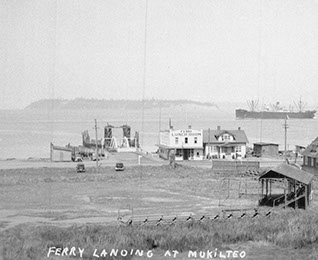 The tradition among Native Americans of coming to this area for meetings, and for fun and games, was continued by the residents of Mukilteo, particularly in the early part of the 20th century. Baseball was truly the national pastime in small towns of the 1920s, and Mukilteo was no exception. The most centrally located flat area in the town, however, was often under water whenever the tide rolled in! Working together, the men of Mukilteo built a series of dikes and sluice boxes to control the flow of water and then with kerosene and torches they cleared out the mosquitos. The swamp was finally conquered. Donations of cash and materials came from the Crown Lumber Company, and other businesses sponsored players with the provision that the firm’s name be sewn onto the back of the player’s uniform. Equipment and other expenses were paid for with a well-worn hat passed through the bleachers for donations at every game. The grandstand and the bleachers were always filled when games were played in Mukilteo, including large numbers of women and children.
The tradition among Native Americans of coming to this area for meetings, and for fun and games, was continued by the residents of Mukilteo, particularly in the early part of the 20th century. Baseball was truly the national pastime in small towns of the 1920s, and Mukilteo was no exception. The most centrally located flat area in the town, however, was often under water whenever the tide rolled in! Working together, the men of Mukilteo built a series of dikes and sluice boxes to control the flow of water and then with kerosene and torches they cleared out the mosquitos. The swamp was finally conquered. Donations of cash and materials came from the Crown Lumber Company, and other businesses sponsored players with the provision that the firm’s name be sewn onto the back of the player’s uniform. Equipment and other expenses were paid for with a well-worn hat passed through the bleachers for donations at every game. The grandstand and the bleachers were always filled when games were played in Mukilteo, including large numbers of women and children.
The Mukilteo Baseball Team was often accompanied on road trips by their loyal fans and relatives. On July 25, 1921, some 250 fans took the steamer Calista to cheer for the team when it played over in Langley on Whidbey Island. Many older Mukilteo residents remember their parents talking about a game in Sultan where a disputed call on the field resulted in thrown objects and then a “joyous free-for-all” among players and spectators. Games were exchanged with most of the neighboring towns in Snohomish County and it was a happy year when Mukilteo brought back the county championship.
Occasionally games were combined with other forms of diversion and entertainment involving nearly everyone in the community. On August 26, 1923, a game with the town of Monroe was folded into a grand event, labelled an “Indian Clambake.” A total of 44 sacks of clams, five sacks of potatoes, and at least a thousand ears of corn were layered with seaweed into a giant pit located near where the ferry terminal is today. Butter clams were cooked separately in giant kettles nearby, along with other picnic fare. As the food was being cooked before the game, there were all kinds of competitions, including baseball throws, a ladies nail-driving contest, and even a fat man’s race. After the game, the Monroe band played music for dancing until the sun went down. Best of all, the Mukilteo nine won the game, 3 – 2, behind the strong pitching of Jimmie Claxton, one of the few black men living in Mukilteo at the time.
Every year since 1966, Mukilteo holds a Lighthouse Festival, usually in early September. Thousands attend, but few realize the depths of the tradition of summertime fun in the area of this walking tour. From the Native American clam feasts of long ago, to the “Indian clambakes” of the 1920s, to the Lighthouse Festivals of today, the tradition continues.
Copyright 2015, Mukilteo Walking Tour. All rights reserved.